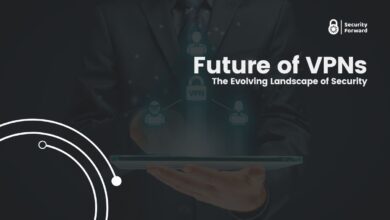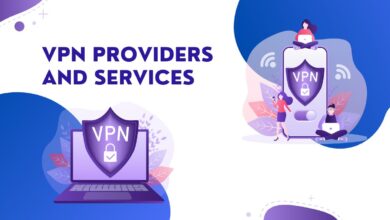VPN Technology and Infrastructure
Understand how VPNs create secure connections over the internet, safeguarding data and privacy with advanced encryption protocols. In this guide, we’ll unravel the complexities of VPN infrastructure, from server networks to tunneling techniques, providing insights into how VPNs operate seamlessly in diverse environments.
VPN Servers and Network
A series of worldwide events in 2022 significantly increased the demand for secure communication, boosting VPN usage by a significant margin. [1]
VPN servers are the backbone of Virtual Private Networks services, providing the necessary infrastructure to secure and anonymize your internet activities. They act as intermediaries between a user’s device and the internet. When you connect to a VPN server, it serves several key functions:
-
Encryption: The VPN server encrypts the data sent from your device. This means it converts your data into a secure code, which ensures that if someone intercepts your data, they won’t be able to understand it.
-
IP Address Masking: The server gives your internet connection a new IP address, which is the number that identifies your device on the internet. By doing this, the VPN server hides your real IP address and can make it appear as though you are accessing the internet from a different location, often in another country. This not only keeps your location private but also allows you to bypass regional restrictions on websites or content through geoblocking. [2]
-
Data Transmission: After encrypting and reassigning your IP address, the VPN server then sends your data to the internet. As a result, any website you visit, or any online service you use will see the VPN server’s IP address instead of yours.
Fast Facts
“Virtual private networks enable you to bypass geo-restrictions and access content and websites not available in your location.”
Tunneling in VPNs
Tunneling in VPNs refers to the method of securely transmitting data over a network. It’s like creating a protected passage through which your internet traffic can move safely, shielded from external threats and online security risks. This process begins when you connect to a VPN service.
-
Initiating the VPN Connection: When you activate your VPN, it establishes a connection to a VPN server. This is the start of creating a secure tunnel.
-
Data Encryption: Your device encrypts the data before sending it out. Encryption transforms your data into a secure code, making it unreadable to anyone who might intercept it.
-
Transmission through the Tunnel: The encrypted data travels from your device to the VPN server through a virtual tunnel. This tunnel is a secure connection that exists within the larger, public internet, but it’s private and inaccessible to outsiders.
-
Data Reaches the VPN Server: Once your encrypted data arrives at the VPN server, the server decrypts it. Decrypting turns the data back into its original, readable format.
-
Data Sent to the Internet: The VPN server then sends the decrypted data to its intended destination on the internet, like a website or an online service. To any external observer, it appears as if the data is coming from the VPN server, not your actual device.
-
Receiving Data: When data is sent back to you from the internet, it first goes to the VPN server. The server encrypts this incoming data and sends it through the secure tunnel.
-
Decryption on Your Device: The encrypted data arrives at your device via the tunnel. Your VPN software then decrypts the data, making it usable for you.
VPN Encryption Methods
VPN encryption methods are techniques used to secure data as it travels through a VPN tunnel. These methods ensure that the data remains private and unreadable to anyone who might intercept it. Various encryption methods are employed in VPNs, each with its own strengths and purposes:
AES Encryption
The Advanced Encryption Standard (AES) is a widely used encryption method in VPNs. It’s known for its high level of security and is often used in government and financial institutions. AES comes in different strengths, with AES-256 bit encryption being the most secure, offering a large number of possible combinations to protect data.
Blowfish Encryption
Blowfish is an older encryption method that is still in use due to its effectiveness and speed. It encrypts data in fixed-length blocks and is known for its efficiency in software and hardware implementations. However, it’s generally considered less secure than AES.
Triple DES (Data Encryption Standard)
Triple DES is an evolution of the original DES encryption. It applies the DES cipher algorithm three times to each data block, making it more secure than its predecessor. While more secure than DES, it’s slower and less efficient than AES.
RSA Encryption
RSA is a public-key encryption method used in VPNs for secure key exchange. It involves a pair of keys, a public key for encryption, and a private key for decryption. RSA is known for its high security, particularly with longer key lengths, but it can be slower than symmetric key methods like AES.
IKEv2/IPsec
This combination of protocols is used for both tunneling and encryption in VPNs. IPsec handles the encryption and security of the data packet, while IKEv2 is responsible for the key exchange. This method is particularly favored for mobile VPNs due to its stability and ability to quickly reestablish lost connections.
VPN Security Features
VPN security features are designed to ensure that your online activities remain private and secure, offering many benefits to your online activities. These features are integral to protecting data from interception or unauthorized access. Here are some key security features commonly found in VPN services:
-
Encryption: This is the fundamental feature of all VPNs. Encryption scrambles data so that it can only be read by someone with the correct decryption key. Most VPNs use strong encryption protocols like AES-256 to secure data.
-
Kill Switch: A VPN kill switch automatically disconnects your device from the internet if your VPN connection drops. This prevents your data and IP address from being exposed unintentionally.
-
No-Logs Policy: Many VPN providers have a no-logs policy, meaning they do not keep records of your online activities. This is crucial for ensuring that your browsing history and data cannot be tracked or handed over to third parties.
-
DNS Leak Protection: VPNs should protect against DNS leaks, which occur when DNS requests are sent outside the VPN tunnel, potentially revealing your actual IP address and browsing history. Leak protection ensures all DNS requests are routed through the VPN.
-
IP Address Masking: VPNs hide your real IP address and replace it with one from their server network. This masks your physical location and makes it harder for websites and trackers to identify you.
-
Secure Protocols: VPNs use secure tunneling protocols like OpenVPN, IKEv2/IPSec, or WireGuard® to create a secure connection between your device and their servers. These protocols have different strengths in terms of speed and security.
-
Split Tunneling: This feature allows you to choose which traffic goes through the VPN and which uses your regular internet connection. It’s useful for accessing local websites or services while still enjoying VPN protection for other activities.
-
Public Wi-Fi Security: VPNs provide extra security when connecting to public Wi-Fi networks, which are often unsecured and vulnerable to hacking.
-
Multi-Factor Authentication: Some VPNs offer multi-factor authentication for an added layer of security. This requires more than one method of verification to access the VPN, reducing the risk of unauthorized use.
VPN and Internet Speed
While VPNs can potentially slow down your internet speed due to encryption and server distance, the impact is often minimal with quality VPN services. Additionally, in some cases, using a VPN might actually improve your speed by circumventing ISP throttling.
When using a VPN, several factors can influence your internet speed, and understanding these can help you optimize your VPN experience. Here’s a breakdown of the key elements:
-
Encryption Overhead: VPNs encrypt your data to keep your online activities secure. This encryption process adds extra data to each packet, which can lead to a slight reduction in speed. The level of encryption, along with the chosen protocol, impacts how much the speed is affected.
-
Distance to the VPN Server: The physical distance between you and the VPN server plays a significant role. The farther the server, the longer it takes for data to travel back and forth, which can increase latency and decrease speed. Choosing a server closer to your location usually results in faster connections.
-
Server Capacity and Quality: The performance of the VPN server itself is crucial. Servers with high bandwidth and good maintenance can handle more traffic and provide faster speeds. Conversely, an overloaded or poorly maintained server may slow down your connection.
VPN Protocols: Different VPN protocols balance speed and security in various ways. For instance, protocols like PPTP are faster but less secure, while others like OpenVPN offer more robust security but might be slower.



